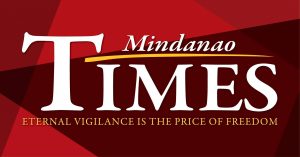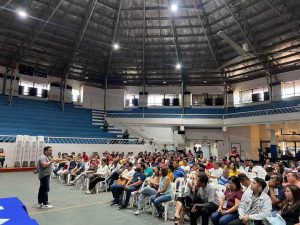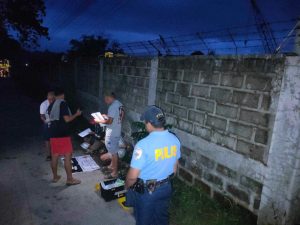 THE CITY government has sought the approval of the Inter Agency Task Force-Regional Task Force on COVID-19 to place the city under the stricter Modified Enhanced Community Quarantine (MECQ) classification until the end of the month.
THE CITY government has sought the approval of the Inter Agency Task Force-Regional Task Force on COVID-19 to place the city under the stricter Modified Enhanced Community Quarantine (MECQ) classification until the end of the month.
The request came about as it has continued to grapple with and increasing number of daily cases.
In its post on its official Facebook account, the city government wanted the new classification be put in place starting Saturday “to allow a circuit breaker in the surge of patients inside hospitals.”
The city government has also requested the residents to familiarize themselves again with the regulations of MECQ as the city has not been placed under such classification since the start of the pandemic.
Based on the IATF-EID quarantine guidelines dated May 20, 2021, any person below 18 years old, those who are over 65 of age, those with immunodeficiency, comorbidity, or other health risks, and pregnant women shall be required to remain in their residences at all times, except for obtaining essential goods and services, or for work in industries and offices or such other permitted activities. Local government units may relax the minimum age range down to 15, depending on the COVID-19 situation in their respective jurisdictions.
Establishments not permitted to operate during MECQ include entertainment venues with live performers such as karaoke bars, bars, clubs, concert halls, theaters, and cinemas; recreational venues such as internet cafés, billiard halls, amusement arcades, bowling alleys, and similar venues; amusement parks or theme parks, fairs/peryas, kid amusement industries such as playgrounds, playroom, and kiddie rides; outdoor sports courts or venues for contact sports, scrimmages, games, or similar activities; indoor sports courts or venues, fitness studios, gyms, spas or other indoor leisure centers or facilities, and swimming pools.
Operations of the following establishments are also prohibited: casinos, horse racing, cockfighting and operation of cockpits, lottery and betting shops, and other gaming establishments except for the draws conducted by the Philippine Charity Sweepstakes Office; indoor visitor or tourist attractions, libraries, archives, museums, galleries, and cultural shows and exhibits; outdoor tourist attractions; venues for meetings, incentives, conferences, and exhibitions; personal care services which include beauty salons, beauty parlors, medical aesthetic clinics, cosmetic or derma clinics, make-up salons, nail spas, reflexology, aesthetics, wellness, and holistic centers, and other similar establishments; acupuncture and electrocautery establishments, and massage therapy including sports therapy establishments; and indoor dine-in services of food preparation establishments such as commissaries, restaurants, and eateries.
Dr. Ashley Lopez, acting head of the City Health Office, told Davao City Disaster Radio (DCDR) Wednesday that those new cases were compounded from May 28 to 31 as result of the series of heightened community testing.
The health official suspected that the sudden spike in COVID-19 cases could have been caused by the presence of an “undetected” variant of SARS-CoV-2, the virus that causes the infection.
He said that he was alarmed that the increase in new COVID-19 cases is sudden, and not gradual.
“I cannot confirm this year but I suspect that there is a variant that’s going around because the increase in new cases is very fast… we have yet to receive a report from Philippine Genome Center. I believe it is because it’s seven times faster than what we had last October and November,” he said.
He surmised that this might have been caused by returning residents from Luzon and Visayas who came home by land to the city when National Capital Region and Cebu grappled with COVID-19 surge.
The request, said Regional Director Alex Roldan of the Department of Interior and Local Government, also the chair of the Regional Inter-Agency Task Force, has been endorsed to the national government for its action.
“They will be communicating to us and the LGU (local government unit) anytime today or tomorrow,” Roldan said.
On Tuesday, the regional office of the DEpartment of Health reported that of the 448 new cases in the region, 338 of them were from the city.
Dr. Michelle Schlosser, spokesperson of City COVID-19 Task Force, said among the sources of these new infections were workplaces like the business process outsourcing companies.
Schlosser earlier told TIMES that the city government ordered the closure of three more BPOs, bringing the number of BPOs put on lockdown to five. The city government has also placed on lockdown the city council building after 10 of the workers in the offices in the building were found infected with the virus.
The new request for a stricter classification is expected to regulate movement of people as well as limit the operations of businesses.
On Monday, Dr. Ricardo Audan, Southern Philippines Medical Center (SPMC) chief, likened the scene at “the emergency section of the hospital with that of a store having a “midnight sale” due to being crowded.
This prompted the hospital to expand its emergency section, intensive care unit and ward for COVID-19 patients.
The SPMC reported Wednesday that its 77-bed intensive care unit (ICU) for COVID-19 patients have been fully occupied while 293 of its 312 ward beds have been utilized as of May 31.
In a related development, the business sector, whose members are expected to bear the brunt of a stricter classification, has supported the move of the city government.
Arturo M. Milan, governor for Southern Mindanao of the Philippine Chamber of Commerce and Industry, said the move will help the city “control transmission and protect our healthcare system from being overwhelmed.”
Milan said that under the MECQ classifications, “vital industries and other businesses can still operate under IATF Guidelines.”
“What is important now is to contain the surge of COVID cases as soon as possible while we continue with the vaccination program,” he added.
Lopez said that the local government opened eight additional temporary treatment and monitoring facilities (TTMFs) with a combined bed capacity of 1,168. The additional facilities brought to 24 the total TTMFs of the city government and the bed capacity at 2,542.
Of the total, he said 16 TTMFs with 1,374 beds have been fully occupied.
He said the private hospitals – Davao Doctors Hospital, Brokenshire Hospital, and Metro Davao Medical and Research Center – have started accommodating COVID-19 patients. Lopez said other hospitals could not open COVID-19 beds as of yet due to lack of nurses and hospital staff.
He added that the DOH-Davao vowed it would provide medical staff to augment the workforce in private hospitals. He added that private hospitals must allocate 30% of their total beds to COVID-19 cases. SPMC, meanwhile, provides 50%.
Lopez disclosed that the local government would procure two buses to hasten the pick-up and transport of patients who would turn out positive for COVID-19 from their homes to the designated isolation facilities.
At the rate new infections are growing, Lopez said health personnel are confronted with delays in picking up patients from their homes.
He said some patients could not be picked up within 24 hours from release of their swab result.
“I would like to ask for an apology. One reason [for the delay] is that we have so many cases. I have requested reinforcement from RAT (Rapid Action Team) for additional vehicles,” he said. With a MindaNews report.




